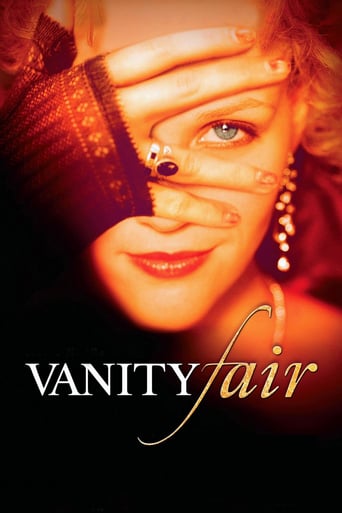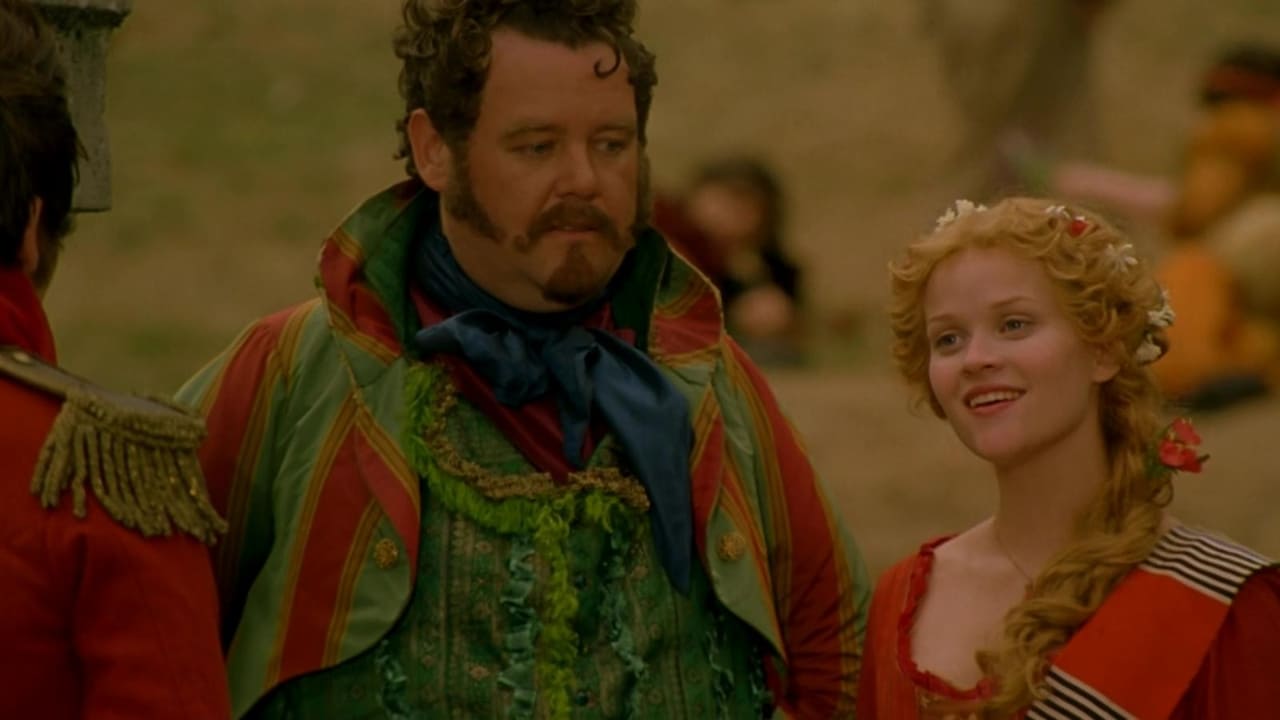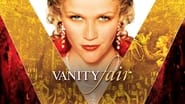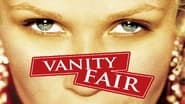lexva5
I didn't read the book before watching this film. Still after going through the 2 hours I can say that this film looks beautiful with exquisite period costumes and settings but the main characters don't come to life. The film concentrates on the exploits of Becky, a girl coming from a poor family climbs her way through the social ladder.
As interpreted by Reese Witherspoon or as written on script, Becky's character feels flat and unnatural and so much is hinged on this character in the film. Either Reese was out of her depths in this or the director/script writers didn't get the feel of how a conniving, calculating but bewitching person could be. or feel. Rosella O Hara in Gone with the Wind springs to mind and VIvian Leigh nailed down the part. That made the whole film spring to life despite the many goings and comings of different characters. Unfortunately Vanity Fair fails in this and most of the characters have a disposable feel to them with a few exceptions
The film still stuns in the visual department with the rich costumes, interiors, colours and delightful gardens being shown. That I enjoyed
lampic
Solid movie adaptation of Thackeray's novel, thought I believe some liberties were taken here because I can't imagine king's entertainment being described as ribald as this one.Nair does a good job of following melodramatic story about young, pretty and ambitious orphan girl rise in the society. No amount of wealth, however, can sidestep the burning question of restrictions set by proper bloodline, so naturally there are enough complications to fill a long TV saga. My initial amusement was slowly replaced with gnawing feeling that this is another "Gone With The Wind" never ending story, where heroine is not exactly likable and guys are goodies. Reese Witherspoon is just fine, though way too modern for a period piece. Rhys Ifans is Rhett Butler here and since nature of his character is far more understandable (gambler with a golden heart) he gets our attention far better. Jonathan Rhys-Meyers is surprisingly effective as movie's true villain, while Bob Hoskins, Jim Broadbent and Eileen Atkins steal the show in supporting roles. It was very entertaining up to certain point, than slowly started to feel overlong.
James Hitchcock
William Makepeace Thackeray's novel "Vanity Fair" is a satire telling of the rise, fall and rise again of the social-climbing adventuress Becky Sharp. Like a number of other literary heroines from this period, most notably Charlotte Bronte's Jane Eyre, Becky starts life as a governess, although she and Jane Eyre are completely different in character. Whereas Jane is morally upright and deeply religious, Becky is scheming and unscrupulous. (Her surname has an obvious symbolic meaning). She marries Rawdon Crawley, an Army officer and the younger son of her employer, becomes the mistress of the wealthy Lord Steyne and, after various reverses of fortune, ends up as the wife of a senior official with the East India Company.Thackeray's title is taken from Bunyan's "Pilgrim's Progress" and refers to a fair which was intended to symbolise man's sinful attachment to the things of this world. His intention was to satirise the snobbishness, hypocrisy and worldliness of British society. Although the events described in the novel take place in the 1810s and 1820s, two or three decades before it was published in 1848, he clearly intended it to have a contemporary relevance, and his readers would have had no difficulty identifying the Becky Sharps and Lord Steynes of their own day.The author described it as a "novel without a hero", and few, if any, of its characters are intended to come across as sympathetic. We may admire Becky's cunning and determination, but her ruthlessness and amorality mark her out as the novel's anti-heroine rather than its heroine. Her husband Rawdon is as amoral as her, and considerably more stupid. Steyne (pronounced "stain"- another symbolic name) is a libertine and a bully. Rawdon's father Sir Pitt Crawley is an oafish vulgarian and his brother Pitt junior a pompous prig. Becky's friend Amelia Sedley is, unlike Becky herself, morally upright, but is also rather dull, lacking in intelligence and a poor judge of character. She persists, for example, in believing, in the teeth of all the evidence, that her rakish fiancé George Osborne, who later becomes her husband, is a paragon of virtue.The novel has been the subject of numerous television and film adaptations, although this is the only one I have seen apart from the British television version from the late eighties. That adaptation kept to Thackeray's plot reasonably faithfully, but scriptwriter Julian Fellowes and director Mira Nair evidently thought that that plot would not work on the big screen because they made a number of changes, most notably to the character of Becky, who becomes far more sympathetic than she was in the original. (There was, apparently, an earlier discarded screenplay in which Becky's character was closer to the way she is depicted in the novel). The character of her husband Rawdon is also somewhat sanitised, and even Steyne at first seems more like a kindly benefactor than a sexual predator. It is only at the end that he reveals himself in his true colours.No film based upon a novel, especially a novel as complex as "Vanity Fair", can ever be 100% faithful to the original, and a number of literary adaptations have been highly successful films in their own right despite departing considerably from their source material. This, however, is not really one of them. If you want to make a film about a feisty young proto-feminist in the Regency era- which is how Fellowes paints Becky- I would not really recommend using Thackeray's novel as a starting-point. Deprived of much of its satirical content, "Vanity Fair" becomes emasculated, just another "heritage cinema" British costume drama.Yet this is not entirely a bad film. Reese Witherspoon makes Becky into an appealing heroine, and cannot be held personally to blame for the fact that the character she is playing is far from being the one that Thackeray created. Her British accent is perhaps not 100% reliable, but this is not so important in period drama, as we do not know exactly how people spoke in the early nineteenth-century, and the difference between British and American accents may have been less marked than it is today. There are also some good performances in cameo roles from the likes of Bob Hoskins as the uncouth Sir Pitt and Eileen Atkins as his wealthy and autocratic sister Miss Matilda.Another attractive feature is the visual look of the film. Nair was clearly aiming to reproduce the look of an Old Master painting, and does this by the use of strong, vivid colours, especially reds and greens, shot through a filter which gives a slightly yellow tint, like a picture seem through a protective layer of varnish. I felt, however, that this is a film which could have been improved had it followed the original novel more closely. 6/10
zaisjr
My girlfriend received this movie as a gift years ago. We finally got around to watching it yesterday. We both were very bored by the film and still aren't sure what the point of the film was. Here are our issues.1. The film had no identity. This seemed to be one of those films that was filmed while writing it. It never seemed to have any purpose and even the director and actors seemed to be lost as to what they expected out of this film. Based on the description on IMDb, I assumed this was your standard film about a poor woman trying to find love and success. But never does it seem that way. It appears that this movie is just about a woman with poor upbringings who is fortunate enough to often be part of rich families, bouncing from family to family, to become nothing more than who she was before.2. There is no growth in the characters, personally nor physically. The character played by Gabriel Byrne looks exactly the way he did 30+ years previously. But the big issue is that none of the characters, including the main character, seem to have much of a personal growth, epiphany, nor any substance. There is no compassion, sympathy, hatred, nor memorable features from these characters. They are far too easy to forget. There is no true hero, protagonist, nor antagonist. Anytime you do start to get to know a character, they take off and leave the film for a moment. Often without explanation.3. The film isn't very easy to follow. Often many characters are introduced without any explanation or understanding of how these characters are important to the story. Matter of fact, many of the characters could have and should have been either expanded upon or written out of the movie. One example of these characters are the children. In the movie one of the characters is pregnant. A family offers to help her with her child while her husband is gone. The child is born. Next thing you know another child is presented without explanation. The first child all of a sudden is no longer living with this family because his mother moved back in with his grandparents. But the movie doesn't tell you this. What happened is that the main family in the story also had a child but failed to mention this. So you are confused when this boy is running around with black hair, then blond, then black, then blond..... it's poor writing. Later on in the movie another child shows up and the movie doesn't explain who the father is, yet all the rest of the characters know who he is without explanation. Also, some of the main characters get married out of the blue without any mention until after the fact. Two characters will meet one day, flirt for a few seconds, then be married without any wedding nor any indication that these two are in love.4. The movie doesn't follow any plot structure that I'm aware of. There is no dramatic climax nor anything building up to one. Like I said before, the movie has no purpose.The only good things I can say about this movie is that it looks great and I really liked the costumes. The setting and photography were excellent. It was just wasted on such a poor script.



 AD
AD









